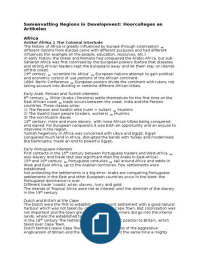Samenvatting
Samenvatting Regions in Development: Africa
- Instelling
- Universiteit Utrecht (UU)
Samenvatting van alle hoorcolleges en artikelen van Afrika voor het vak Regions in Development. Ideaal als voorbereiding voor het tentamen van ! Geschreven in eenvoudig engels, waardoor het goed te begrijpen is en je het niet zelf meer hoeft te vertalen.
[Meer zien]




